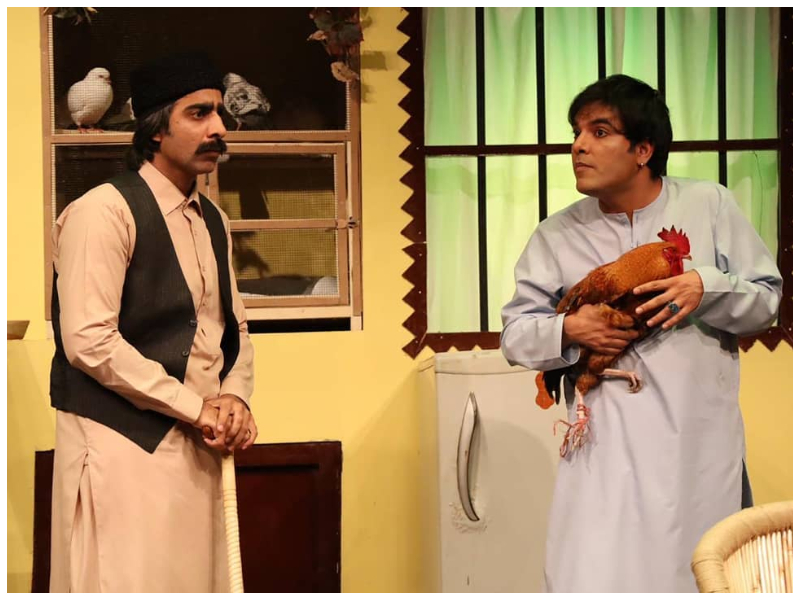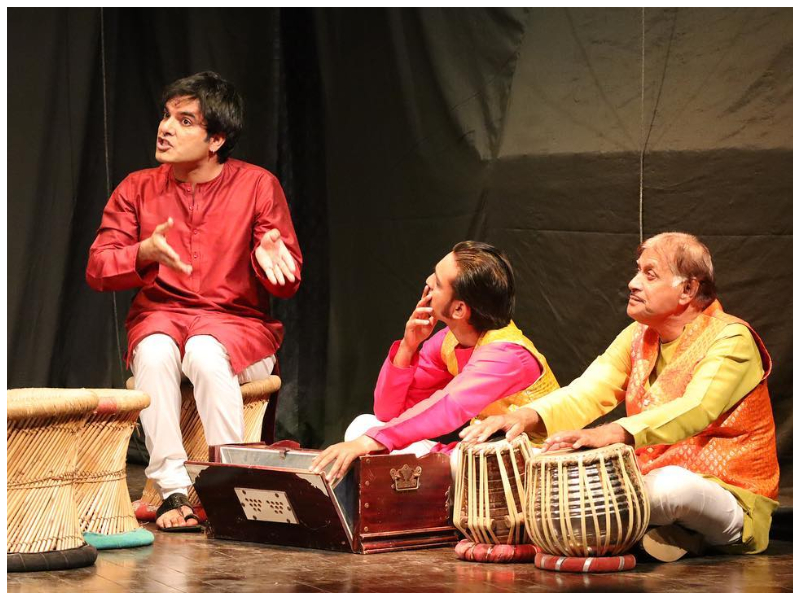The stage is set and the background music of old songs brings back memories of the classic play. The curtain rises with Aangan Terha’s original track and we see familiar settings; a takht with a gao takiya, a gramophone, a cage with pigeons and a ladder set against the wall. For those who have been fans of the original masterpiece, there is an immediate connect. Anwar Maqsood, with his crisp writing and one-liners, lets us submerge in the wistfulness, while keeping it au courant with punches from the modern times.
One instantly wants to see Shakil lying on that takht, listening to any old song on the gramophone while playing with his moustaches as Bushra Ansari eyes him when he sings ‘Mujhse pehli si muhabbat mere mehboob na maang’. But the scenario is different, the faces are different. However, the charm and charisma of the original is invigorated and doesn’t leave one asking for more.
The highlight of the 80’s original Aangan Terha was Salim Nasir’s character – Akbar – played to perfection by the late veteran actor. His energy, charm, style, wit and comic timings are unparalleled. Yasir Hussain wears his shoes in the prequel and boy! The actor has worked hard on it, performing it to a T. Clad in a kurta and tang pajama, as he walks with a tray with tea cups around the set, the scene instantly takes you down memory lane. Yasir is impeccable as Akbar to say the least. It seems that he has internalized the character’s persona down to the smallest detail. He is the hero, anchor and the lifeline of the script and on stage.
Read: Anwar Maqsood announces new play ‘Naach Na Jaanay’ for 2019Â

Instagram: Akbar with Chaudhry sahab
We reminiscence how Akbar used to remind Mehboob and Jahan Ara (played by Abdullah Farhatullah and Sara Bhatti here) about his unpaid salary 30,615 rupay, surkh tang pajama, and that he is an artiste. A new story development in this version when Akbar recollects how his livelihood and passion – dancing – was banned in Zia ul Haq’s reign. The grand musical performance by Wahab Shah and company to mark the end of Bhutto’s era is magnificent; we missed Yasir performing in it as well.
Anwar Maqsood has created an intelligent mix of old dialogues and scenarios along with fresh additions in the script. The writer has tried to explore the difficulties that artistes went through during Zia’s regime, but on a very light note. Though it may seem to be slightly underplaying the grotesque circumstances that the media industry went through during the era, the blithe route he takes is refreshing.
Moreover, Aangan Terha will always stay relevant because the originality of thought in its content. Anwar Maqsood has taken the novelty further by adding bits that are part and parcel of modern-day Pakistani society, following the wave of feminism and surge of technology. We hear dialogues like ‘Pani ubla hua lenge ya brown?’, ‘Jo azaan deta ha (murgha) us ke samosay haram hein’, ‘6 larkiyan Larkana bhijwa do’, ‘Agar wo jinn ki bachi ha tou humein us ke dance se kya karna’ reminds us of the biases, prejudices and harassment we witness each day.

One particular instance, which received unrelenting applause was when Akbar went to Imran Khan (played by the play’s director Dawar Mehmood) to search for work in the cricket team in the 80’s. It is a quintessential Anwar Maqsood-style jibe at the current Prime Minister’s journey.
During the conversation Imran Khan says, ‘Mar jaonga politics mein nahi aaonga’
Then he declares, ‘Hum naya Pakistan banayein gay!’ And when asked by Akbar, ‘Us mein naya kya hoga?’
Khan’s reply was, ‘Hoga toh sub purana, bus keh dein gay keh naya hai!’
And later he asks, ‘Dance academy tou khatam hogai, larkiyan kahan hein?’
Akbar says, ‘Apne ghar pe’ and Khan replies ‘Ghar kahan hein?’
Indeed a daring and dauntless Anwar Maqsood can pull this off.
The only comedy that leaves a bad taste is toilet humour and fat-shaming jokes, which could easily be avoided. The world has become a weird place where even movies are being made literally on toilets and constipation, but everything should be in context. When you have A-class content and brilliant performance, there shouldn’t be any need of below the belts jibes to crack the audiences. Nevertheless, Naach Na Jaanay by Kopykats Productions has all the spices of a hit play. It holds a mirror where we can see a reflection of the society which isn’t as amusing as it seems on stage.





